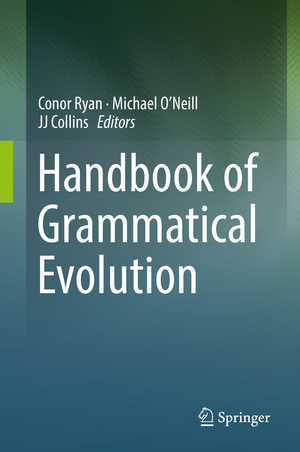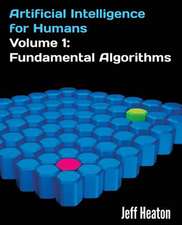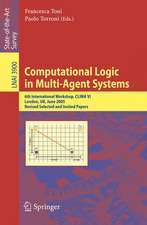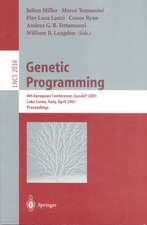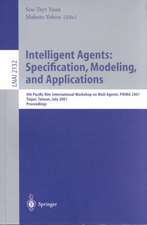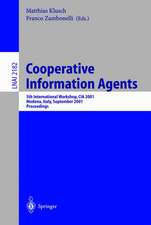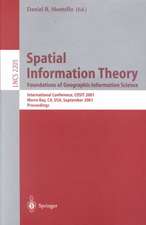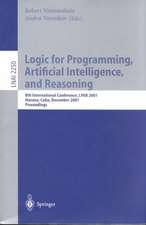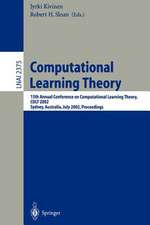Handbook of Grammatical Evolution
Editat de Conor Ryan, Michael O'Neill, JJ Collinsen Limba Engleză Hardback – 21 sep 2018
The book first introduces GE to the novice, providing a thorough description of GE along with historical key advances. Two sections follow, each composed of chapters from international leading researchers in the field. The first section concentrates on analysis of GE and its operation, giving valuable insight into set up and deployment. The second section consists of seven chapters describing radically different applications of GE.
The contributions in this volume are beneficial to both novices and experts alike, as they detail the results and researcher experiences of applying GE to large scale and difficult problems.
Topics include:
• Grammar design
• Bias in GE • Mapping in GE
• Theory of disruption in GE
· Structured GE
· Geometric semantic GE · GE and semantics
· Multi- and Many-core heterogeneous parallel GE
· Comparing methods to creating constants in GE
· Financial modelling with GE
· Synthesis of parallel programs on multi-cores
· Design, architecture and engineering with GE
· Computational creativity and GE
· GE in the prediction of glucose for diabetes
· GE approaches to bioinformatics and system genomics
· GE with coevolutionary algorithms in cybersecurity
· Evolving behaviour trees with GE for platform games · Business analytics and GE for the prediction of patient recruitment in multicentre clinical trials
| Toate formatele și edițiile | Preț | Express |
|---|---|---|
| Paperback (1) | 899.90 lei 17-23 zile | +72.70 lei 7-13 zile |
| Springer International Publishing – 31 ian 2019 | 899.90 lei 17-23 zile | +72.70 lei 7-13 zile |
| Hardback (1) | 1004.00 lei 6-8 săpt. | |
| Springer International Publishing – 21 sep 2018 | 1004.00 lei 6-8 săpt. |
Preț: 1004.00 lei
Preț vechi: 1255.00 lei
-20% Nou
Puncte Express: 1506
Preț estimativ în valută:
192.11€ • 201.12$ • 158.96£
192.11€ • 201.12$ • 158.96£
Carte tipărită la comandă
Livrare economică 05-19 aprilie
Preluare comenzi: 021 569.72.76
Specificații
ISBN-13: 9783319787169
ISBN-10: 3319787160
Pagini: 495
Ilustrații: X, 497 p. 177 illus., 79 illus. in color.
Dimensiuni: 155 x 235 mm
Greutate: 0.89 kg
Ediția:1st ed. 2018
Editura: Springer International Publishing
Colecția Springer
Locul publicării:Cham, Switzerland
ISBN-10: 3319787160
Pagini: 495
Ilustrații: X, 497 p. 177 illus., 79 illus. in color.
Dimensiuni: 155 x 235 mm
Greutate: 0.89 kg
Ediția:1st ed. 2018
Editura: Springer International Publishing
Colecția Springer
Locul publicării:Cham, Switzerland
Cuprins
1 Introduction to GE.- 2 Understanding Grammatical Evolution: Grammar Design.- 3 Bias in Grammatical Evolution.- 4 Mapping in Grammatical Evolution.- 5 Theory of Disruption in GE.- 6 Structured Grammatical Evolution.- 7 Geometric Semantic Grammatical Evolution.- 8 GE and Semantics.- 9 Multi- and Many-core Heterogeneous Parallel Grammatical Evolution.- 10 Grammatical Evolution.- 11 Financial Modelling with Grammatical Evolution.- 12 Synthesis of Parallel Programs on Multi-cores.- 13 Design, Architecture and Engineering with Grammatical Evolution.- 14 Computational Creativity and Grammatical Evolution.- 15 Grammatical Evolution in the Prediction of Glucose for Diabetes.- 16 Genomics.- 17 Grammatical Evolution with Coevolutionary Algorithms in Cybersecurity.- 18 Evolving Behavior Trees with Grammatical Evolution for Platform Games.- 19 Patient Recruitment in Multicentre Clinical Trials.
Notă biografică
Conor Ryan is Associate Professor of Machine Learning at the University of Limerick where he is director of the Biocomputing and Developmental Systems Group. His background includes the development of Machine Learning algorithms and their application to industrial scale problems such as medicine and microelectronics, and he holds several patents in the area of non-volatile memory. He was previously a Fulbright Scholar in the Computer Science and Artificial Intelligence Lab at MIT in 2013 and is also CTO of software at NVMdurance, a company that uses Machine Learning to extend the endurance of Flash Memory.
Michael O'Neill holds the ICON Chair of Business Analytics at University College Dublin, and is Associate Dean - Director of the UCD Michael Smurfit Graduate Business School. He is a founding Director of the UCD Natural Computing Research & Applications Group and has over 300 publications on genetic programming, natural computing and their application in areas such as telecommunications networks, creativity, design, engineering, business analytics and finance. He has co-authored four monographs including Grammatical Evolution (2003), Biologically Inspired Algorithms for Financial Modelling (2006), Foundations in Grammatical Evolution for Dynamic Environments (2009), and Natural Computing Algorithms (2015).
J.J. Collins holds an MSc in Artificial Intelligence from Queen Mary University of London. He is lecturer in the department of Computer Science and Information Systems at the University of Limerick, and is currently working on a higher research degree in the area of Evolutionary Computation. His background includes computer vision, robotic mapping and localisation, minimisation of perceptual aliasing in reinforcement learning agents, and synthesis of algorithms using evolutionary paradigms. He was a core contributor to the design of the first Masters in Artificial Intelligence in Ireland in 2017. For J.J., the allure of the field of artificial intelligence, and the evolutionary paradigm in particular, has grown stronger over the years.
J.J. Collins holds an MSc in Artificial Intelligence from Queen Mary University of London. He is lecturer in the department of Computer Science and Information Systems at the University of Limerick, and is currently working on a higher research degree in the area of Evolutionary Computation. His background includes computer vision, robotic mapping and localisation, minimisation of perceptual aliasing in reinforcement learning agents, and synthesis of algorithms using evolutionary paradigms. He was a core contributor to the design of the first Masters in Artificial Intelligence in Ireland in 2017. For J.J., the allure of the field of artificial intelligence, and the evolutionary paradigm in particular, has grown stronger over the years.
Textul de pe ultima copertă
This handbook offers a comprehensive treatise on Grammatical Evolution (GE), a grammar-based Evolutionary Algorithm that employs a function to map binary strings into higher-level structures such as programs. GE's simplicity and modular nature make it a very flexible tool. Since its introduction almost twenty years ago, researchers have applied it to a vast range of problem domains, including financial modelling, parallel programming and genetics. Similarly, much work has been conducted to exploit and understand the nature of its mapping scheme, triggering additional research on everything from different grammars to alternative mappers to initialization.
The book first introduces GE to the novice, providing a thorough description of GE along with historical key advances. Two sections follow, each composed of chapters from international leading researchers in the field. The first section concentrates on analysis of GE and its operation, giving valuable insight into set up and deployment. The second section consists of seven chapters describing radically different applications of GE.
The contributions in this volume are beneficial to both novices and experts alike, as they detail the results and researcher experiences of applying GE to large scale and difficult problems.
Topics include:
• Grammar design
• Bias in GE • Mapping in GE
• Theory of disruption in GE
· Structured GE
· Geometric semantic GE · GE and semantics
· Multi- and Many-core heterogeneous parallel GE
· Comparing methods to creating constants in GE
· Financial modelling with GE
· Synthesis of parallel programs on multi-cores
· Design, architecture and engineering with GE
· Computational creativity and GE
· GE in the prediction of glucose for diabetes
· GE approaches to bioinformatics and system genomics
· GE with coevolutionary algorithms in cybersecurity
· Evolving behaviour trees with GE for platform games · Business analytics and GE for the prediction of patient recruitment in multicentre clinical trials
The contributions in this volume are beneficial to both novices and experts alike, as they detail the results and researcher experiences of applying GE to large scale and difficult problems.
Topics include:
• Grammar design
• Bias in GE • Mapping in GE
• Theory of disruption in GE
· Structured GE
· Geometric semantic GE · GE and semantics
· Multi- and Many-core heterogeneous parallel GE
· Comparing methods to creating constants in GE
· Financial modelling with GE
· Synthesis of parallel programs on multi-cores
· Design, architecture and engineering with GE
· Computational creativity and GE
· GE in the prediction of glucose for diabetes
· GE approaches to bioinformatics and system genomics
· GE with coevolutionary algorithms in cybersecurity
· Evolving behaviour trees with GE for platform games · Business analytics and GE for the prediction of patient recruitment in multicentre clinical trials
Caracteristici
Examines the state of the art in Grammatical Evolution
Demonstrates a variety of significant applications for Grammatical Evoluation
Provides literature review and reflection spanning two decades of research in the field
Demonstrates a variety of significant applications for Grammatical Evoluation
Provides literature review and reflection spanning two decades of research in the field
